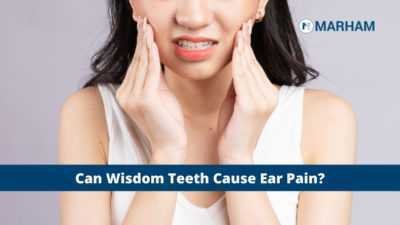Wisdom teeth usually appear between the 17 to 21 age group, making them the last permanent teeth in your mouth. As a result, because there isn’t enough room in the jaw, they’re also the most likely teeth to become wedged-in or impacted. Wisdom teeth that enter the jaw sideways, tilted, or misaligned will press up against the surrounding teeth, shifting your smile. And on the other hand, wisdom teeth cause ear pain.
Wisdom teeth are frequently a source of discomfort for people worldwide. When you see yours appear, it’s a good idea to get them checked out as soon as possible to know if they’re working correctly.
These teeth do not appear until a person is a young adult, and they usually appear before the age of 25. It is perfectly normal to experience pain due to these teeth appearing – but how much pain is normal?
Why Do Wisdom Teeth Cause Problems?
When a wisdom tooth becomes impacted, it is prevented from fully erupting through the gum tissue, and this frequently results in the tooth being angled rather than upright. If an impacted wisdom tooth is not extracted as soon as possible, it can cause several other problems.
Overcrowding in the mouth is the most common cause of pain when these teeth appear. If this is the case, your wisdom teeth may need to be extracted. On the other hand, if there is enough space in your mouth for the teeth to come through, you should not feel too much pain.
Common Symptoms of Wisdom Teeth Impaction:
When wisdom teeth erupt through the gums, they are usually accompanied by discomfort. However, if a wisdom tooth becomes impacted, it can quickly become a problem.
While some impacted wisdom teeth cause no pain or discomfort, the following are the most common symptoms of an impacted wisdom tooth:
- Gums that are painful and swollen
- Tenderness in the vicinity of the swollen gums
- Bad breath that persists
- The ache in the area of the jaw where the tooth is located
- Opening and closing the mouth is brutal.
- Earaches that occur frequently
Infection Due To Wisdom Teeth:
When a wisdom tooth begins to press against a neighboring molar, it can cause tooth movement. Gaps and spaces between your teeth form challenging to clean while brushing. As a result, these spaces become ideal for accumulating food and bacteria, which eventually leads to cavities and tooth decay. Untreated tooth decay causes infection, which spreads quickly throughout the mouth.
Bacteria can build up in this area if the problematic tooth is not removed as soon as possible. It may be difficult to reach the brush that way, or it may be too painful to brush and floss thoroughly. In this case, you may develop an infection in that area. This is when you might experience symptoms like a sore throat, fever, or swollen lymph glands.
Can Wisdom Teeth Cause Ear Pain?
The answer is yes. As the infection appears in your mouth, it causes soreness in the mouth, throat, and lymph glands. Ultimately it results in ear pain.
Ear discomfort or pain can be caused by temporomandibular joints or impacted wisdom teeth. So, your wisdom teeth are closer to your ears. The pain or discomfort caused by your wisdom teeth can hurt your ear, resulting in severe earaches.
Ibuprofen and other over-the-counter pain relievers treat pain (in the ear, jaw, or teeth). Antibiotics may be prescribed if ear infections are common or severe.
If you have any of these signs and symptoms of impacted or infected wisdom teeth, you should see your dentist. The dentist will examine the area and take X-rays to see if your wisdom teeth are impacted and to determine the source of your discomfort. If your wisdom teeth are causing problems, they will have to be extracted.
Book an appointment now, to answer all your queries. You can book an appointment with the top dentist in Pakistan through Marham by calling at Marham helpline: 0311-1222398 or by online booking facility through the website or Marham mobile app.
| Android | IOS |
|---|---|
  |
  |
FAQs
-
Why do wisdom teeth cause problems?
There is less space for wisdom teeth in your mouth, and that’s why they cause a problem by impaction.
-
What are the symptoms of wisdom teeth impaction?
Pain, swelling, infection in gums, throat, ear, and lymph nodes are the common symptoms of wisdom teeth impaction.
-
Can Wisdom Teeth Cause Ear Pain?
Yes, wisdom teeth cause ear pain when they are causing infection in your gums.

